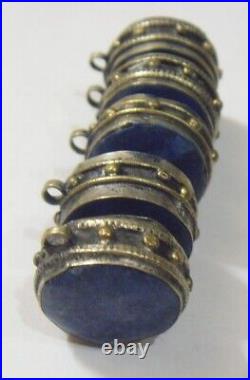







Check out my other items. Approximate size it is 22 x 20 x 11 mm at max points. All hand made items can have some variations. There may be some oxidization on parts of the item due to its age and tribal usage conditions. We also feature the finest selection of lapis Judaic Kuchi ethnic nomadic cultural jewelry, antiquities and curiosity items. Picture is not to the scale, if the coin (3/4 inch, 1 inch = 2.54 cm) is there it is for the size measure. The listed item is / are from an old collection closeout. Depending on your video monitor’s resolution and color settings or calibrations the picture may differ slightly in color from the actual item. In the pictures there may be some reflection from the lights. Please take a good look at pictures. Payments are due with in 3. Some of the antique and vintage tribal jewelry items may have a some missing glass stones here and there. VOID WHERE PROHIBITED BY LAW. Return for this item is accepted only if the item is not as described. Even if items are on sale, please feel free to make your offers. All reasonable offers are welcome. Lapis lazuli, an exquisite gemstone revered for its rich blue color and captivating history, has fascinated humanity for thousands of years. From ancient civilizations to modern times, this gem has adorned the creations of artisans, captured the imagination of poets and artists, and held significant cultural and spiritual symbolism. In this essay, we will explore the origins, historical significance, cultural uses, and enduring allure of lapis lazuli. Lapis lazuli, with its intense blue hue often speckled with golden pyrite inclusions, is a metamorphic rock primarily composed of minerals such as lazurite, calcite, and pyrite. Its name, derived from the Latin words “lapis” meaning stone and “lazuli” meaning blue, aptly describes its striking appearance. The finest specimens of lapis lazuli are sourced from mines in Afghanistan, notably the Sar-e-Sang mines, which have been producing this precious gemstone for over 6,000 years. The allure of lapis lazuli reaches far back into human history, with evidence of its use dating back to the Neolithic period. Ancient civilizations such as the Sumerians, Egyptians, Greeks, and Romans held this gemstone in high regard for its rarity, beauty, and believed mystical properties. In ancient Egypt, lapis lazuli was associated with the sky god and was often used in jewelry, statues, and burial masks. The Egyptians also ground it into a powder to create the renowned pigment known as ultramarine, used by Renaissance painters and later by renowned artists like Vermeer. Cultural Uses and Symbolism. Lapis lazuli holds deep cultural and symbolic significance in various cultures around the world. In ancient Mesopotamia, it was considered a sacred stone associated with the goddess Inanna and was used in decorative arts and jewelry. In Buddhism, lapis lazuli is considered a stone of wisdom and truth, symbolizing the deep blue sky and eternal spiritual essence. Tibetan Buddhists believe that the Medicine Buddha emanates a healing blue light reminiscent of lapis lazuli. In medieval Europe, lapis lazuli was prized for its association with royalty and spirituality. It was often used in religious art, adorning illuminated manuscripts and altarpieces. The gem’s deep blue color was seen as a symbol of divine presence and the celestial realm. Lapis lazuli was also used as a protective stone, believed to ward off evil spirits and bring good fortune.

